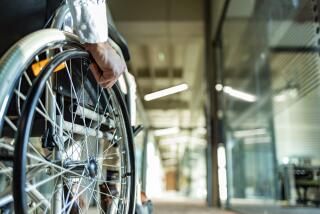The Price of Handicapped Parking
- Share via
One of the few advantages multiple sclerosis has afforded me is the use of a blue parking placard for the handicapped. If muscle weakness and fatigue are my handicaps, why should I feel embarrassed when other people see me pull into a “blue space”? But I do. I always hope no one will notice that I seem able-bodied. Sometimes I am tempted to limp.
But on this day, I don’t hesitate, placing the placard on my dash and parking between the blue lines. As I return to my car sometime later, wearily juggling bags and boxes, I notice a car in the handicapped space next to mine. I notice because the driver, a middle-aged man, is glaring at me. He shakes his head in disgust. His look of resentment is fully intended to shame me.
My heart begins to race; my body temperature rises noticeably. I attempt to get his attention, to wave my placard in his view, but now he is ignoring me, avoiding eye contact. I want to honk, shout--anything. I back out of the space just as he maneuvers a wheelchair out of his trunk, rolling it to the passenger side of his car. Still struggling to defend myself, I roll my window down and say assertively, “I have multiple sclerosis.” At that moment, he lifts out a frail, trembling woman and places her gently into the wheelchair. She addresses me with words that pierce my heart. “So do I.”
I am shaken. As I drive out of the parking lot, tears fill my eyes and begin to spill down my cheeks, quickly turning into little streams of ruined makeup. My mind is filled with unruly and unwelcome emotions: indignation, anger, sorrow, fear. Indignation that I should have to explain my limitations. Sorrow for myself and for this nameless woman who knows intimately the darker side of this disease. Fear. I am frightened by her condition. I want to pretend we do not share the same illness and possibly the same future.
At the same time, I feel violated by a self-righteous and judgmental society that narrowly defines disability. I am not in a wheelchair. My handicap is hidden. Do these facts eliminate the possibility that I share the same limitations as those who are visibly disabled? Like those in the community of the recognizably handicapped, I must adapt to a world that is restricted and structured by my disease. “Normal” (for me) now includes a list of diminishing abilities and activities. Five years ago, it felt “normal” to bound up stairs two steps at a time, ignoring the handrail. Now “normal” finds me inching along the staircase, one step at a time, one hand firmly planted on an adjacent wall. Normal means no more two-mile walks with friends; my left leg begins dragging halfway home. No more high heels and dancing with my husband; my weak ankles and absence of balance and coordination has seen to that. These activities, trivial to some, but precious to me, have been taken from me by this disease. I want to shout at the world, “Give me a break! I’ll give you this handy placard if you’ll take my disease! Deal?”
With my mind on autopilot, I numbly steer my car toward the freeway entrance. I am anxious to escape, exhausted by my emotions, feeling as though I have lived a week in the last five minutes. All the implications of multiple sclerosis seem to be haunting me and I long for the refuge and quiet of home.
Since writing this, I have had yet another blue parking space confrontation. And it is likely I will continue to wrestle with people’s perceptions of my apparent wellness. Will I learn to pardon those who misunderstand and judge me? Can I release my resentment toward the man in the mall and others who mirror his reaction? Will my character grow even while my body weakens? How will I process the grief and anger that surprise me with their intensity? Will I ever be at home in my own changing body?
I suppose I will always have to deal with surges of emotion as I face the losses and challenges that MS brings. Today I grieve freely and fully. Tomorrow I will begin again and move on.


